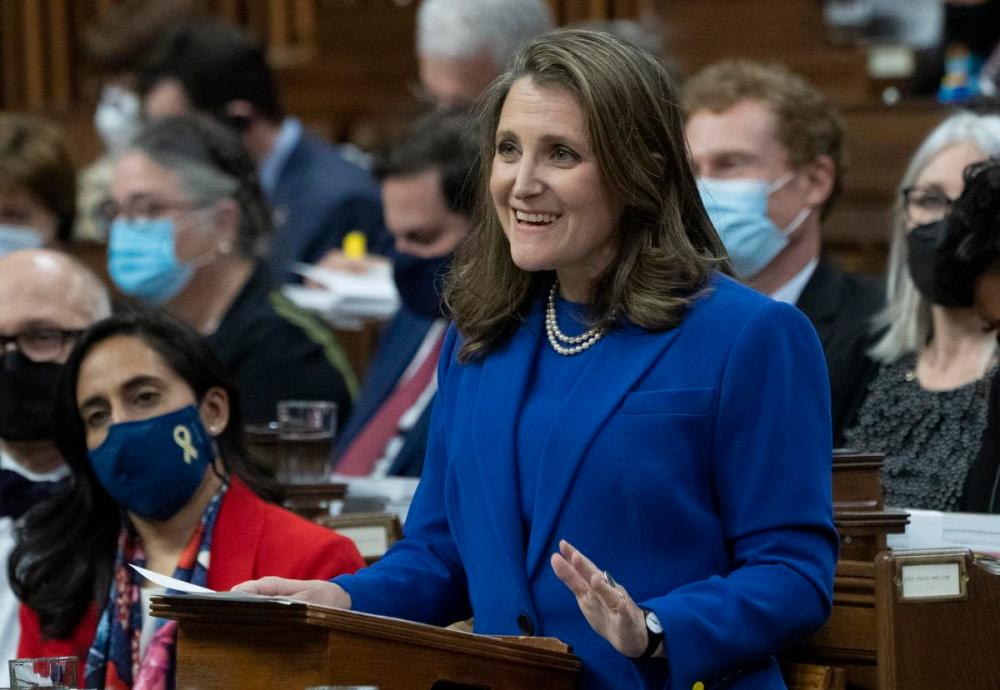Her free-spending ways behind her, Chrystia Freeland is all business now
Advertisement
Read this article for free:
or
Already have an account? Log in here »
To continue reading, please subscribe:
Monthly Digital Subscription
$1 per week for 24 weeks*
- Enjoy unlimited reading on winnipegfreepress.com
- Read the E-Edition, our digital replica newspaper
- Access News Break, our award-winning app
- Play interactive puzzles
*Billed as $4 plus GST every four weeks. Offer only available to new and qualified returning subscribers. Cancel any time.
Read unlimited articles for free today:
or
Already have an account? Log in here »
Hey there, time traveller!
This article was published 08/04/2022 (1060 days ago), so information in it may no longer be current.
Finance Minister Chrystia Freeland offered a course correction in her second budget Thursday. The federal Liberal government shifted focus from pumping the demand side of the economy to focusing on supply, investing in measures that, hopefully, spur more investment, more productivity, and more economic growth. The federal budget also signalled a readjustment to how Freeland wants to be seen: not as a free-spending Liberal but as a responsible economic manager.
“The money that rescued Canada and the Canadian economy,” she writes in the forward of the document, “has depleted our treasury.”
“Our ability to spend is not infinite,” she adds.

The country’s fiscal anchor — a declining debt-to-GDP ratio — will remain a line Freeland pledges not to cross. “Canada has a proud tradition of fiscal responsibility. It is my duty to maintain it — and I will.”
She promised to review and reduce government spending — booking $9 billion in unnamed savings over five years and $3 billion thereafter — by winding down unnecessary spending, reallocating resources, limiting travel, possibly selling federal lands or real estate, and digitizing service delivery. She avoided saying the word “cuts” and instead offered this was “the responsible thing to do.”
Despite the Conservatives decrying the Liberals’ budget as “irresponsible” for “out of control spending,” this is a modest budget. Even with an unexpected windfall boosting revenue projections by $90.6 billion over six years, only $7.4 billion is booked in new spending this year, and $29 billion over the next five years. The rest goes to pay down the debt.
“That’s a surprise I think for most people,” said Kevin Page, Canada’s first parliamentary budget officer and now the head of the Institute of Fiscal Studies and Democracy at the University of Ottawa. “They wouldn’t think the Liberals would do something like that, maybe. It sounds very fiscally responsible.”
There are, of course, questions about this budget. Robert Asselin, the former budget director to finance minister Bill Morneau, was skeptical a $4-billion housing accelerator fund will push municipalities to build the type of housing people want. The now senior vice president at the Business Council of Canada said he’s also concerned a new $40,000 tax-free first home savings account will mostly “benefit rich kids,” as fewer than 10 per cent of Canadians currently max out their Registered Retirement Savings Plan (RRSP) and Tax-Free Savings Account (TFSA).
Critics noted the $8 billion in new defence spending only brings Canada to 1.5 per cent of GDP spending, several marks short of the two per cent requested of NATO allies.
And there are many unknowns about two new arm’s-length bodies intended to boost growth, the creation of the Canada Growth Fund and the Canadian Innovation and Investment Agency.
But there is no denying that Freeland showed restraint — and it is a significant pivot from her early days as finance minister and as a Liberal candidate.
In 2013, when she was pounding the pavement in Toronto Centre, Freeland and Justin Trudeau were focused on income inequality. Her book, “Plutocrats,” detailed how the super rich had gotten richer and she often spoke about the hollowing out of the middle class. Even though some Canadian economists noted 21st century statistics didn’t bear that out.
The early Trudeau government years centred around the theme of helping the middle class and people working hard to join it. Liberals proudly note their Canada Child Benefit has lifted 435,000 children out of poverty since 2015. Last year’s budget had 90 mentions of the word “poverty,” Thursday’s had four — all to describe previous actions.
Just 19 months ago, when Freeland presented her first economic update, it projected a $381 billion deficit — driven by COVID spending, she pledged another $100 billion to help the economy “come roaring back” and announced the seeds of a Canada-wide early learning and child-care system.
This week, she could say her job on both those fronts is done. Every province and territory signed a child-care agreement, GDP is up, unemployment is down, and there are more jobs than there are people to fill them.
But that 2020 fall economic update was also packed full of promises about addressing the gaps exposed by the pandemic, such as helping lower-wage Canadians, people with disabilities, and establishing national standards for long-term care. Thursday’s budget had little or nothing to say about those things.
But it did have $100 million for an LGBTQ2 action plan, $70 million for Jewish community projects, and $17.7 million for a review of cryptocurrencies — a likely wedge issue with the Conservatives.
Budgets are inherently political, and Freeland may have three more — time to invest in fulfilling election promises on hiring doctors and pharmacare. But what this one says is Freeland likes her laundry list short, her attention focused, and that she is capable of saying “no.”
Althia Raj is an Ottawa-based national politics columnist for the Star. Follow her on Twitter: @althiaraj


